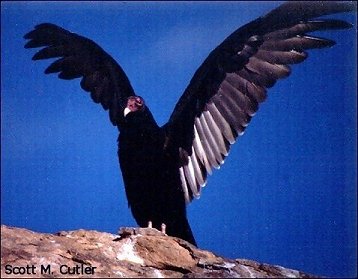
|
Context Kingdom: Animalia |
 |
Turkey Vulture Cathartes aura. Photograph by Scott Cutler. |
About 26-32 inches (65-80 cm) long with a wingspread of 6 feet (2 meters). The adult has a small naked red head with two-toned blackish wings and paler flight feathers. The legs and talons are red (Peterson, 1990). Its wings are long and broad for slow soaring over wide areas. The bill is heavy for tearing flesh, while the feet are weak and not suitable for grasping prey (Leahy, 1982).
Cathartes aura tends to live in forested or, more commonly, open situations from the lowlands to the mountains (American Ornithologists' Union, 1983). It is usually seen soaring or perched on dead trees, posts, carrion, or the ground (Peterson, 1990).
This species can be found from southern Canada throughout all of the continental United States, Central America, and South America to the Straits of Magellan (American Ornithologists' Union, 1983).
The diet of this diurnal bird of prey consists of carrion, garbage, and offal. It will occasionally eat weak live animals, fruit, or healthy small animals (Leahy, 1982).
The female usually lays two, rarely one or three, off-white, yellowish, buff, grey or greenish eggs marked with dark brown or reddish speckles. There is no nest. The eggs are laid in a cave, rock crevice, hollow tree trunk, stump, or on the ground under vegetation. They may be moved within the general nesting area (Leahy, 1982). These oval-shaped eggs hatch in 7-8 weeks and the pulli fledge at 10 weeks (Fisher and Peterson, 1977).
The Turkey Vulture soars with its wings in a shallow V (dihedral) pattern. When standing it rocks and tilts unsteadily (Peterson, 1990). This normally silent bird will utter faint hisses, grunts, or barks when alarmed (Leahy, 1982).
American Ornithologists' Union. 1983. Check-list of North American birds, 6th ed. Allen Press, Lawrence, 877 pp.
Fisher, J., and R. T. Peterson. 1977. World of birds. Crescent Books, New York, 191 pp.
Leahy, C. 1982. The birdwatcher's companion: an encyclopedic handbook of North American birdlife. Hill and Wang, New York, 917 pp.
Peterson, R. T. 1990. A field guide to western birds. Houghton Mifflin Company, Boston, 432 pp.
Mary Kirschenbaum, July 1996.